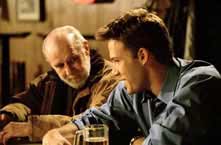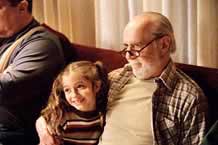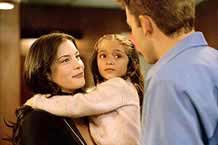Jersey Girl (2004)
 |
JERSEY GIRL
Review by Gnoll |
Okay, before I get started here, I’m going to address one point. I get a lot of flak here for my comments on the work of one Kevin Smith. I’ve gotten some nasty e-mails from Smith fanatics that wish me death for giving anything he touches less-than-stellar reviews. I’ve even had one person threaten to beat me with a Silent Bob inaction figure as some form of redemption. So for all of you whose teeth clench at the mere thought of criticism for your fat hero, get ready to unbunch your panties, because I’m not pulling punches here.

But again, I’m going to remind everyone again that the reason I’m so critical of Kevin Smith is because I’m a fan. I’ve seen CLERKS somewhere in the neighborhood of 32,057 times, I own Jay and Silent Bob toys, I’ve bought Smith’s comic books, I’ve even been to the Quik Stop in Leonardo and spent sixty bucks in one fell swoop at Jay and Silent Bob’s Secret Stash in Red Bank. That said, I’ve always rooted for the guy. But it’s kind of like being from Atlanta and being a Braves fan: no matter how much you root for them, they always seem to find a way to blow it.
This brings me to JERSEY GIRL, Smith’s sixth feature film and the first one to stray from the ViewAskewniverse, or more correctly, the first of his films to not feature Jay and Silent Bob. This film has been anticipated for a couple of years now, receiving a lot of hype as a new direction for the filmmaker. I looked forward to seeing the film, hoping that maybe this would mean that Smith had “grown up” and realized where his strengths and weaknesses lied. I was a bit skeptical when the initial announcements made it sound as if it were a vehicle for the media darling couple collectively referred to as “Bennifer”, but I was willing to give it a chance. It was later revealed that Jennifer Lopez’s role was fairly small, and after critics vomited all over GIGLI and it subsequently tanked at the box office, Lopez’s role was trimmed down even further. But the jury was still out on JERSEY GIRL.
Going in to this film, I was wanting to enjoy it. Unfortunately, I was expecting not to. All together, those elements can generally only create a positive bias for a film. And for a while, I was enjoying the film. It’s not a bad story, and some of the key performers do a pretty good job in it. But after a while, I started noticing some things that really bugged me.

First thing I noticed was kind of the odd effect of trying to forget that it was a Kevin Smith film to begin with. But while watching these characters speak, I noticed that the unnatural choppy way this dialogue was being formed reminded me of something. Suddenly I realized why it seemed so familiar — It felt like it was out of a Kevin Smith film. Yes, the way Smith’s characters talk is still completely unrealistic and feels rehearsed. Honestly, it kind of feels like the way people talk in student films, definitely not the type of dialogue you’d expect in the sixth feature from a successful filmmaker.
But I can let this slide. I’m okay with just chalking this up as director’s signature. Smith made this style work in films where the premise involved a bunch of know-it-all slackers doing nothing, so his fans are probably looking for this sort of thing. So we’ll get to the next point of contention: the way Smith writes women. I don’t know if it’s misogyny or simply a lack of understanding of the feminine side, but Smith still writes women like they’re drunken sailors on shore leave. They speak crudely, often moreso than the men in his films. The first time we meet Jennifer Lopez’s Gertrude, she’s making a joke to George Carlin’s Bart about dumping Bart’s son Ollie (Affleck) after sleeping with him a few times. Our first real introduction to Liv Tyler’s Maya involves her working on a study of pornography, which quickly regresses into her propositioning Ollie for sex.
But again, we can maybe chalk this up to director signature. It worked in CHASING AMY, where the lead character was a lesbian, and he toned it down a bit in DOGMA, so perhaps he was just trying to make a point here that flew over my head. Whatever. I’m willing to give him the benefit of the doubt.

Now, the real trouble begins as we start getting into the emotional sequences in the film. Oh, and if you’re not aware of it, there’s quite a few in this movie. But don’t worry, because Smith will be happy to remind you every chance he gets that this is the moment that you start to weep. You see, the biggest flaw of JERSEY GIRL is not the amateurish dialogue or the one-dimensional characterization. The real problem here is that it’s so saccharine that you’ll start counting the number of times you roll your eyes in the film. A chain reaction of supposed heart-touching moments fly at you so fast you’ll want to make sure you’ve got your hands up and ready to swat at them. Gertrude dies, leaving Ollie alone with his daughter. Ollie struggles with keeping his career as a main focus while trying to be a father. Ollie loses his job in a fit of stress and moves in with his father in Jersey. Ollie has a few spats with his daughter Gertie. Everyone kisses and makes up a few times.
And each time, it’s almost as if a sign pops up on screen and says “cry!” The music swells, characters are shown crying or spilling their hearts all over the place, and I groan. I groan because this happens no less than a half-dozen times in the film, each time more transparent than the previous. On top of that, the sappy dialogue is just the icing on the proverbial cake. If I hadn’t gone into the film on an empty stomach, I would have had trouble keeping my lunch down when Ollie tells little Gertie that she’s the only thing he’s ever been good at. It’s all so blatantly designed to invoke emotions that it comes off as paper-thin.
Even going further to this is the way that Smith chooses to build his characters. Rather than try to establish characters and relationships through interaction and dialogue (which may be a blessing in disguise, noting my earlier criticism) everything is explained by a musical sequence. There’s about a dozen or so songs used as bumpers for montages, and all of them are as transparent as the ridiculous emotion-wringers I mentioned in the last paragraph. And some of the music is so friggin’ inappropriate that I actually am hesitant to blame Smith for their choices, assuming that these have to be last-minute pieces tossed on by the producers because they got the rights for real cheap.

The one big scene that isn’t done like this, though, is our big epiphany scene involving a cameo from The Fresh Prince himself, Will Smith. Of course, this one’s no better, because we see it coming from a mile away. And while on the subject of Smith, the film seems to be set in this bizarro chronological timeline. You see, after Gertie is born, Ollie loses his job over a flap at a press meeting shortly before 1996’s INDEPENDENCE DAY is released. Seven years later, he’s talking about Smith’s Summer 2004 film I, ROBOT in the past tense, which means there’s a year missing somewhere. Not that it’s a huge deal, but I still thought it was amusing enough to merit a mention here.
Oh, and I don’t know whose decision it was to go with this motif, but when you’ve got Affleck’s Ollie out trying to get his career back on track, especially considering these interviews are in the publicity industry, you might want to have the character shave and run a brush through his hair every now and again. I’m just sayin’.
Now while I’ve sprayed a lot of vitriol here, I’m not going to pretend that I was completely miserable sitting in the theater watching this film. There were a lot of elements I enjoyed, and I think that this could have been a great story if it were given to another director. The script itself isn’t bad, and a lot of its flaws (the aforementioned dialogue issues) could easily be remedied by a more experienced (and I hate to say that, because it ain’t like Kevin’s a new kid anymore) director. There were a few performances I liked, including George Carlin’s and Jennifer Lopez’s. Racquel Castro is actually tolerable as the young Gertie, turning in one of the least annoying child-actor performances I can remember. However, when J.Lo is the best actor in your film, you might be looking at some problems. Not that J.Lo’s a bad actress — she turned in a handful of good performances before she became the most annoying person in the media — but she ain’t the greatest out there. Liv Tyler meekly mumbles her way through her part as usual, and Affleck is — well, he’s playing Ben Affleck the way nobody else can.
But in the end, JERSEY GIRL just re-enforces the notion that Smith still has a long way to go before he’s going to be respected as more than a gross-out comedy kingpin. JERSEY GIRL has its good points, but its bad points stick out like a sore thumb. This is a step up for Smith, as it is a better film than JAY AND SILENT BOB STRIKES BACK, but that’s like saying Castro is an improvement over Stalin.

 subscribe to rss
subscribe to rss 

























Leave your response!